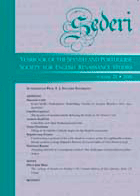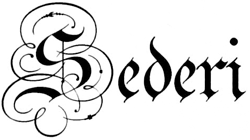
Sederi 25
Sederi 25 — 2015
EDITORS
Berta Cano Echevarría & Ana Sáez-Hidalgo
REVIEW EDITOR
Francisco J. Borge López
ISSN 1135-7789
Maurizio Calbi, “Exilic/Idyllic Shakespeare: Reiterating Pericles in Jacques Rivette’s Paris nous appartient.” SEDERI 25 (2015): 11-30.
DOI: https://doi.org/10.34136/sederi.2015.1 Download PDF
Abstract
Jacques Rivette’s Paris nous appartient (1961) is about a literature student, Anne Goupil, who becomes involved with a group of bohemians centering around the absent figure of Spanish musician, Juan. The film incorporates the attempt by theatre director Gérard Lenz – in many ways a simulacrum of Rivette himself – to stage Pericles, even though this is a play that he himself defines as “incoherent” and “unplayable.” This essay explores the significance of this incorporation, and shows how the reiterated, fragmentary rehearsals of this “unplayable” play are essential to an understanding of the (disjointed) logic of the film as well as the atmosphere of conspiracy it continually evokes. It also argues that the “Shakespeare” included in the film is an “exilic Shakespeare” that does not properly belong, a kind of spectre haunting the film characters. This construct uneasily coexists with a version of “Shakespeare” that the film simultaneously emphasizes – a “Shakespeare” that takes place “on another level” (in Anne’s words), an idyllic and idealistic entity.
Keywords: Shakespearean adaptation; nouvelle vague; Pericles; Exilic Shakespeare; Jacques Rivette; Paris nous appartient; Paris Belongs to Us; New Wave Shakespeare.
References
Burnett, Mark Thornton 2007. Filming Shakespeare in the Global Marketplace. Houndsmill: Palgrave.
Burt, Richard 2009. “Mobilizing Foreign Shakespeare in Media.” Eds. Alexander C. Y. Huang and Charles S. Ross. Shakespeare in Hollywood, Asia, and Cyberspace. West Lafayette: Purdue University Press: 231-38.
Burt, Richard 2010. “Jacques Rivette and Film Adaptation as ‘Dérive-ation’: Pericles in Paris Belongs to Us and The Revenger’s Tragedy in Noiroit.” Ed. Greg Colón Semenza. The English Renaissance in Popular Culture. An Age for All Time. New York: Palgrave Macmillan: 167-86.
Calbi, Maurizio 2013. Spectral Shakespeares. Media Adaptations in the Twenty-First Century. New York: Palgrave Macmillan.
Cartelli, Thomas and Katherine Rowe 2007. New Wave Shakespeare on Screen. Cambridge: Polity Press.
Charnes, Linda 2006. Hamlet’s Heirs: Shakespeare and the Politics of a New Millennium. London and New York: Routledge.
De Pascale, Goffredo 2002. Jacques Rivette. Milano: Il castoro.
Deleuze, Gilles 1986 (1983). Cinema 1. The Movement-Image. Trans. Hugh Tomlinson and Barbara Habberjam. London: Athlone Press.
Deleuze, Gilles 1989 (1985). Cinema 2. The Time-Image. Trans. Hugh Tomlinson and Robert Galeta. London: Athlone Press.
Derrida, Jacques 1994. Specters of Marx. The State of the Debt, the Work of Mourning and the New International. Trans. Peggy Kamuf. London and New York: Routledge.
Frappat, Helene 2001. Jacques Rivette, secret compris. Paris: Cahiers du cinéma.
Ffrench, Patrick 2010. “Play Space, Plot Structure: Theatricality and Conspiracy in the Films of Jacques Rivette.” Australian Journal of French Studies 47/2: 160-70.
Freud, Sigmund 1953-74 (1901). The Psychopathology of Everyday Life. The Standard Edition of the Complete Psychological Works of Sigmund Freud. Vol. 6. London: Hogarth Press.
Gozlan, Gérard 2009 (1962). “The Delights of Ambiguity – In Praise of André Bazin.” Eds. Peter Graham with Ginette Vincendeau. The French New Wave: Critical Landmarks. London: British Film Institute: 91-129.
Hillier, Jim 1986. “Introduction: Cahiers du Cinéma in the 1960s.” Ed. Jim Hillier. Cahiers du Cinéma: 1960-1968: New Wave, New Cinema, Reevaluating Hollywood. Cambridge, Mass.: Harvard University Press: 1-26.
Lack, Roland-François 2010. “Paris nous appartient: Reading Without a Map.” Australian Journal of French Studies 47/2: 133-45.
Lanier, Douglas 2007. “Introduction. On the Virtues of Illegitimacy: Free Shakespeare on Film.” Ed. Richard Burt. Shakespeares after Shakespeare. An Encyclopedia of the Bard in Mass Media and Popular Culture. Vol. 1. Westport and London: Greenwood Press: 132-37.
Lanier, Douglas 2011. “Nouveau Noir: Claude Chabrol’s Ophélia, Shakespeare’s Hamlet, and the Nouvelle Vague.” Eds. Sarah Hatchuel and Nathalie Vienne-Guerrin. Shakespeare on Screen. Hamlet. Rouen: PURH: 235-56.
Monaco, James 1976. The New Wave: Truffaut, Godard, Chabrol, Rohmer, Rivette. Oxford: Oxford University Press.
Morrey, Douglas and Alison Smith 2009. Jacques Rivette. Manchester: Manchester University Press.
Neupert, Richard 2007. History of the French New Wave Cinema. Madison: University of Wisconsin Press.
Rivette, Jacques dir. 1961. Paris nous appartient. Ajym-Films and Les films du carrosse. Film.
Rivette, Jacques 1986 (1968). “‘Time Overflowing’: Rivette in interview with Jacques Aumont, Jean-Louis Comolli, Jean Narboni, Sylvie Pierre.” Ed. Jim Hillier. Cahiers du Cinéma: 1960-1968: New Wave, New Cinema, Reevaluating Hollywood. Cambridge, Mass.: Harvard University Press: 317-23.
Romney, Jonathan 2006. “Introduction.” Paris nous appartient. British Film Institute. DVD.
Rosenbaum, Jonathan, ed. 1977. Rivette. Texts and Interviews. London: British Film Institute.
Sellier, Geneviève 2008. Masculine Singular. French New Wave Cinema. Trans. Kristin Ross. Durham: Duke University Press.
Shakespeare, William 2004. Pericles. Ed. Suzanne Gossett. The Arden Shakespeare. London: Methuen.
Shakespeare, William 1999. The Tempest. Ed. Virginia Mason Vaughan and Alden T. Vaughan. The Arden Shakespeare. London: Thomson.
Truffaut, François 2009 (1954). “A Certain Tendency in French Cinema.” Eds. Peter Graham with Ginette Vincendeau. The French New Wave: Critical Landmarks. London: British Film Institute: 39-64.
Wiles, Mary M. 2012. Jacques Rivette. Urbana: University of Illinois Press.
